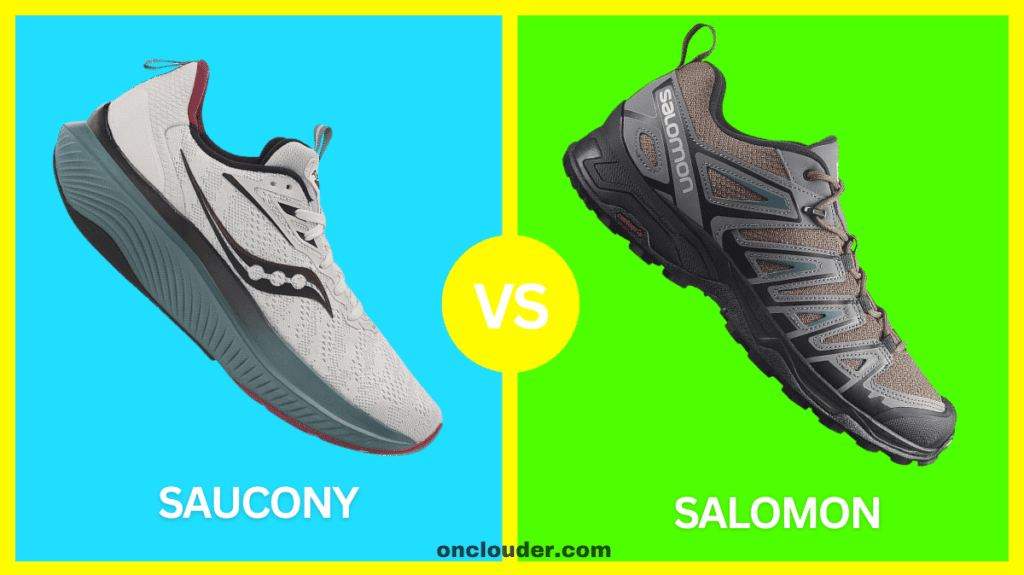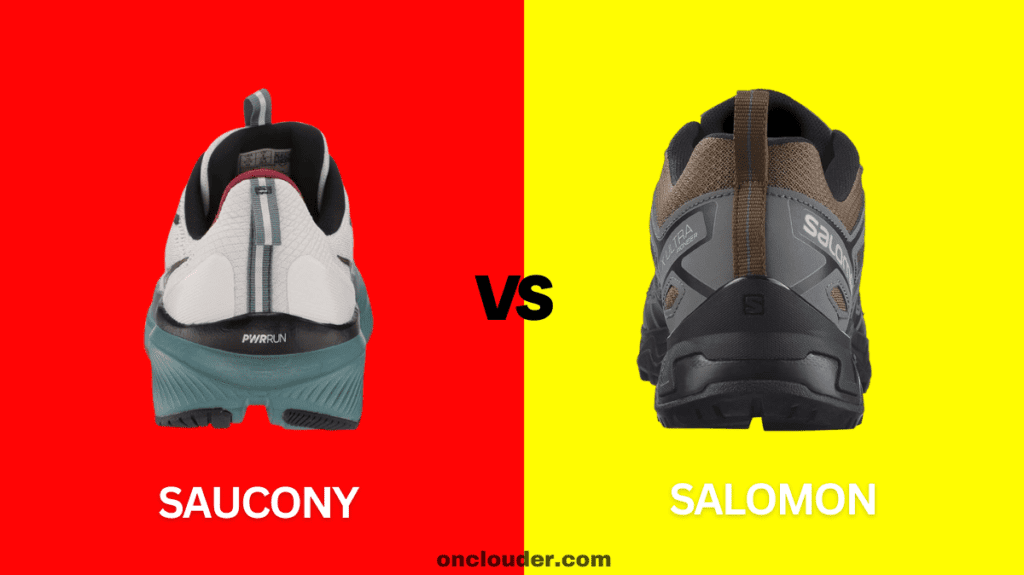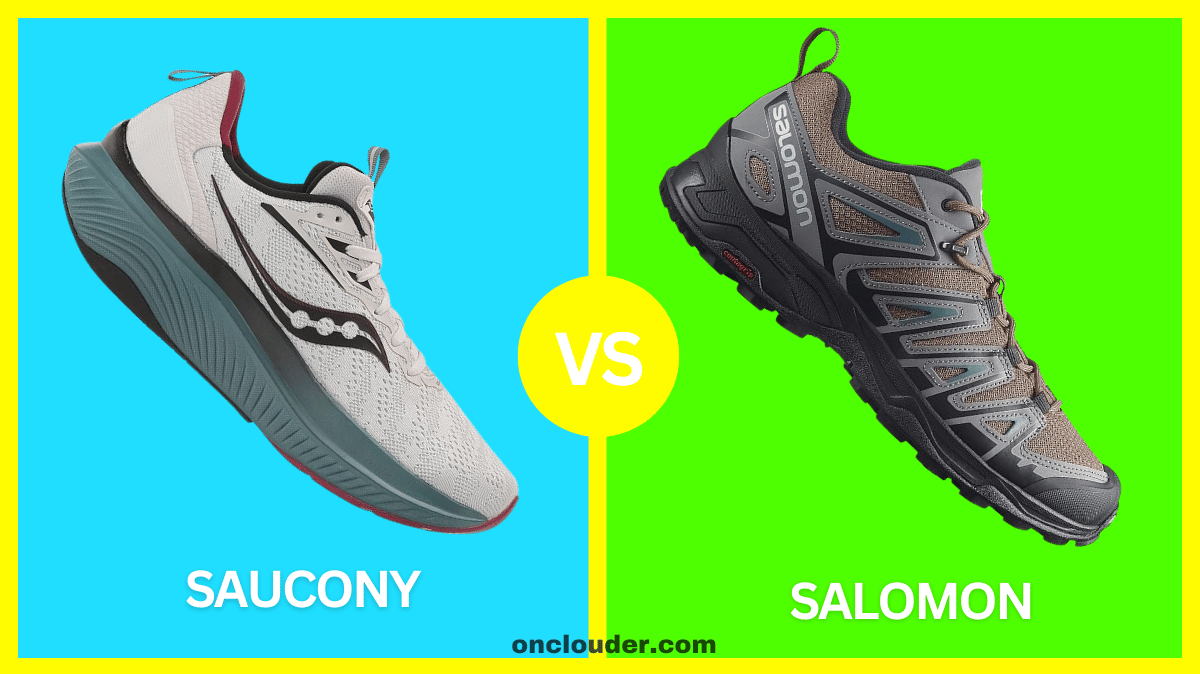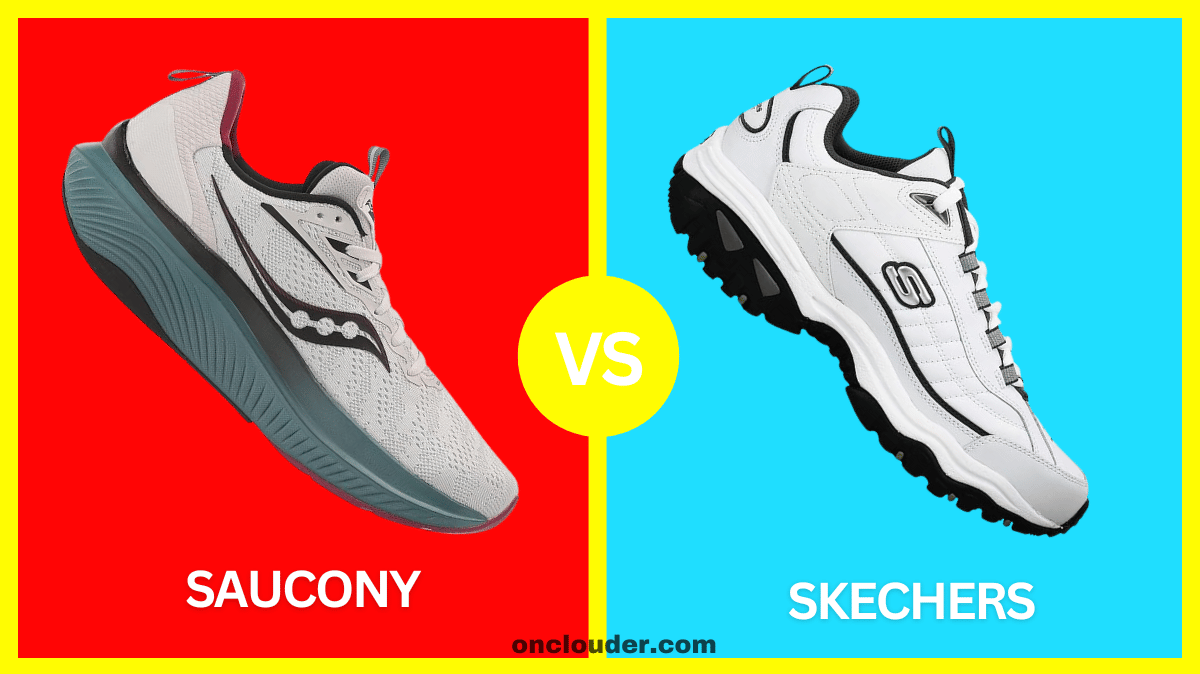Are you trying to decide between Saucony and Salomon shoes? Don’t worry, we’ve got you covered!
We’ll compare these two awesome brands and help you figure out which one might be the best fit for your feet.
Let’s lace up and dive in!

Contents
- 1 Saucony vs Salomon Shoes
- 2 What’s the Big Deal About Saucony and Salomon?
- 3 Durability: Built to Last?
- 4 Breathing: Let Your Feet Breathe!
- 5 Cushioning: Bouncy or Firm?
- 6 Shoe Fit: Snug or Roomy?
- 7 Stability: Steady as You Go
- 8 Comfort: Happy Feet?
- 9 Quality: Built to Last?
- 10 Style: Looking Good!
- 11 Size: Finding the Right Fit
- 12 Material: What Are They Made Of?
- 13 Weight: Light as a Feather?
- 14 Flexibility: Bend and Flex
- 15 Water Resistance: Splash Proof?
- 16 Sole: Grippy or Slippy?
- 17 User Reviews and Ratings
- 18 Price Comparison
- 19 Pros and Cons
- 20 Conclusion
- 21 Frequently Asked Questions
Saucony vs Salomon Shoes
The main difference between Saucony and Salomon shoes is their focus. Saucony is best for road running and everyday use, while Salomon shines in trail running and hiking. Saucony shoes are often softer and more flexible, great for smooth surfaces.
Salomon shoes are tougher and have better grip for rough outdoor terrain. Both brands make comfy, high-quality shoes, but for different uses.
Now, let’s create a detailed comparison table for Saucony vs Salomon Shoes:
| Feature | Saucony | Salomon |
|---|---|---|
| Best For | Road running, everyday use | Trail running, hiking |
| Cushioning | Softer, more bouncy | Firmer, more responsive |
| Fit | Often roomier, especially in toe box | Usually snugger fit |
| Durability | Good for road use | Excellent for rough terrain |
| Weight | Generally lighter | Often slightly heavier |
| Grip | Good on roads and smooth surfaces | Excellent on trails and rough terrain |
| Breathability | Very breathable | Good, but some models less breathable |
| Water Resist. | Some models water-resistant | Many waterproof options |
| Style | More variety in colors and designs | Focused on rugged, outdoorsy look |
| Price Range | $40 – $150 | $60 – $180 |
In summary: Saucony and Salomon are both great shoe brands, but they’re good for different things. If you like running on roads or need comfy shoes for school, Saucony might be better for you.
They’re softer and come in lots of cool styles. But if you love hiking or running on trails, Salomon could be your best choice. They’re tougher and grip the ground really well.
What’s the Big Deal About Saucony and Salomon?
Before we start our shoe showdown, let’s get to know our contenders a bit better.
Saucony: The Running Champ
Saucony (say it like “sock-uh-knee”) is a brand that’s been around since 1898! They’re famous for making great running shoes. Whether you’re sprinting on a track or jogging in the park, Saucony has a shoe for you.
Salomon: The Trail Master
Salomon is a bit younger, born in the French Alps in 1947. They started by making ski gear but now they’re super popular for their trail running and hiking shoes. If you love outdoor adventures, Salomon might be your new best friend.
Durability: Built to Last?
Saucony Shoes
Saucony shoes are tough cookies. They use strong materials that can handle lots of running and walking. Many runners say their Saucony shoes last for hundreds of miles!
Salomon Shoes
Salomon shoes are like tanks for your feet. They’re made to handle rough trails, rocks, and even small streams. If you’re tough on your shoes, Salomon can take it.
Winner: It’s a tie! Both brands make durable shoes, but Salomon might edge out if you’re into rough outdoor activities.
Breathing: Let Your Feet Breathe!
Saucony Shoes
Saucony uses special fabrics that let air flow through your shoes. This helps keep your feet cool and dry, even when you’re working up a sweat.
Salomon Shoes
Salomon also cares about keeping your feet fresh. They use mesh materials in many of their shoes to let air in and out. Some of their trail shoes have water-resistant features, which might make them a bit less breathable.
Winner: Saucony takes this one, especially for everyday use and road running.

Cushioning: Bouncy or Firm?
Saucony Shoes
Saucony is known for its comfy cushioning. They have different types, from super soft to more responsive. Their PWRRUN cushioning feels like running on clouds!
Salomon Shoes
Salomon’s cushioning is usually firmer. This helps you feel the ground better when you’re on trails. But don’t worry, they’re still comfy for long hikes or runs.
Winner: If you love soft, bouncy shoes, Saucony wins. But if you prefer a firmer feel, go with Salomon.
Shoe Fit: Snug or Roomy?
Saucony Shoes
Saucony shoes often have a roomier toe box (that’s the front part of the shoe where your toes go). This can be great if your feet are wider or if you like some wiggle room.
Salomon Shoes
Salomon shoes usually have a snugger fit. This helps keep your foot stable on uneven ground. They often use a special lacing system called Quicklace, which lets you tighten the whole shoe with one pull.
Winner: It depends on your feet! If you like a roomy fit, try Saucony. If you prefer a snug fit, Salomon might be your pick.
Stability: Steady as You Go
Saucony Shoes
Saucony offers a range of stability options. Some of their shoes have extra support to help if your feet roll inward too much when you run (that’s called overpronation).
Salomon Shoes
Salomon’s trail shoes are built for stability on uneven ground. They often have wider bases and special treads to keep you steady on rocks and roots.
Winner: For road running stability, Saucony wins. For trail stability, Salomon takes the prize.
Comfort: Happy Feet?
Saucony Shoes
Saucony focuses on making shoes that feel great right out of the box. Their cushioning and roomy fit make for happy feet on long runs or walks.
Salomon Shoes
Salomon shoes might take a bit more breaking in, but they’re designed to be comfortable for long days on the trail. Their snug fit can prevent blisters on rough terrain.
Winner: For instant comfort, Saucony wins. For long-term comfort on trails, Salomon edges ahead.
Quality: Built to Last?
Saucony Shoes
Saucony has a reputation for making high-quality shoes. They use good materials and pay attention to the little details that make a shoe great.
Salomon Shoes
Salomon is known for their top-notch construction. Their shoes are built to handle tough conditions, which shows in their quality.
Winner: It’s a tie! Both brands are committed to making excellent shoes.
Style: Looking Good!
Saucony Shoes
Saucony offers a wide range of colors and styles. They have everything from bright and bold to simple and classic looks.
Salomon Shoes
Salomon’s style is more about function than fashion. Their shoes look rugged and ready for adventure, which is cool in its own way.
Winner: If you want more style options, Saucony wins. If you like the outdoorsy look, Salomon is your brand.
Size: Finding the Right Fit
Saucony Shoes
Saucony offers a good range of sizes, including half sizes and some wide options. They’re pretty true to size, meaning the size you usually wear will probably fit.
Salomon Shoes
Salomon also has a good size range. Some people find they need to go up a half size in Salomon shoes, especially for trail running when your feet might swell.
Winner: It’s a tie, but try both brands to see which fits you best.
Material: What Are They Made Of?
Saucony Shoes
Saucony uses a mix of materials. You’ll find mesh for breathability, synthetic overlays for support, and rubber soles for grip. Some of their shoes use recycled materials, which is great for the environment.
Salomon Shoes
Salomon often uses tougher materials to handle outdoor conditions. You’ll see sturdy mesh, water-resistant fabrics, and thick rubber soles with deep treads.
Winner: It depends on what you need. For everyday use, Saucony’s materials are great. For tough outdoor use, Salomon’s materials shine.

Weight: Light as a Feather?
Saucony Shoes
Saucony makes some super lightweight shoes, especially for racing. Even their everyday running shoes are usually pretty light.
Salomon Shoes
Salomon’s trail shoes are often a bit heavier because of the extra protection and grip they provide. But they still try to keep them as light as possible.
Winner: For lightweight shoes, especially for road running, Saucony wins.
Flexibility: Bend and Flex
Saucony Shoes
Many Saucony shoes are quite flexible, especially in the forefoot. This can make for a more natural running or walking motion.
Salomon Shoes
Salomon shoes are often less flexible, especially in their trail models. This helps protect your feet from rocks and provides more stability on uneven ground.
Winner: For flexibility, especially for road running, Saucony comes out on top.
Water Resistance: Splash Proof?
Saucony Shoes
Most Saucony shoes aren’t specifically designed to be water-resistant, though some models have water-repellent features.
Salomon Shoes
Many Salomon shoes have water-resistant or even waterproof options. This is great for trail running or hiking in wet conditions.
Winner: Salomon takes this one, especially if you need shoes for wet conditions.
Sole: Grippy or Slippy?
Saucony Shoes
Saucony soles are designed for good grip on roads and smooth surfaces. They use different rubber compounds to balance durability and traction.
Salomon Shoes
Salomon soles are like tiny tire treads for your feet! They’re made to grip all sorts of surfaces, from muddy trails to slippery rocks.
Winner: For road running, Saucony wins. For trail and all-terrain use, Salomon is the champ.
User Reviews and Ratings
Let’s see what other kids and teenagers think about these brands!
| Brand | Model | Rating | Review |
|---|---|---|---|
| Saucony | Ride 15 | ⭐⭐⭐⭐ | “Super comfy for my cross-country practice!” – Alex, 14 |
| Saucony | Kinvara 13 | ⭐⭐⭐⭐ | “Light and fast, perfect for track meets!” – Jess, 13 |
| Salomon | Speedcross 5 | ⭐⭐⭐⭐ | “Awesome grip on muddy trails!” – Sam, 15 |
| Salomon | XA Pro 3D | ⭐⭐⭐⭐ | “Great for hiking and everyday wear.” – Taylor, 12 |
Price Comparison
Here’s a quick look at the price ranges for these brands:
| Brand | Type | Price Range |
|---|---|---|
| Saucony | Running Shoes | $80 – $150 |
| Saucony | Kids’ Shoes | $40 – $70 |
| Salomon | Trail Shoes | $100 – $180 |
| Salomon | Kids’ Shoes | $60 – $100 |
Remember, prices can change, and you might find sales or discounts!
Pros and Cons
| Brand | Pros (Good Things) | Cons (Not-So-Good Things) |
|---|---|---|
| Saucony | Super comfy for running on roads | Not great for rough trails or hiking |
| Lots of fun colors and styles | Might not last as long on tough terrain | |
| Usually lighter, making them comfy for all day | Not as waterproof as some Salomon shoes | |
| Great for school and everyday activities | Might not give enough support on uneven ground | |
| Often less expensive than Salomon | Could be too soft for some people’s liking | |
| Salomon | Awesome for hiking and trail running | Can feel stiff or heavy for everyday use |
| Really good grip on slippery or rough ground | Often more expensive than Saucony | |
| Many waterproof options for wet weather | Fewer color and style choices | |
| Built tough to last a long time outdoors | Might feel too snug for some people | |
| Great support for your feet on uneven trails | Can be hot in warm weather due to waterproofing |
Conclusion
Whew! We’ve covered a lot of ground (pun intended) in comparing Saucony and Salomon shoes. So, which brand is right for you? Here’s a quick summary:
Choose Saucony if:
- You mostly run or walk on roads and smooth surfaces
- You like a softer, bouncier feel
- You want more style options
- You prefer a lighter, more flexible shoe
Choose Salomon if:
- You love hiking or trail running
- You need extra grip and stability on rough terrain
- You often encounter wet conditions
- You like a snugger, more supportive fit
Remember, the best shoe for you is the one that feels most comfortable on your feet. If you can, try on both brands and see which one feels like it was made just for you!
Frequently Asked Questions
Are Saucony shoes good for school?
Yes! Many Saucony models are great for everyday wear, including school. Look for their casual or all-day comfort styles.
Can I use Salomon shoes for gym class?
Absolutely! While they’re designed for trails, many Salomon shoes work well for general athletic activities too.
Do these brands make shoes for kids with wide feet?
Yes, both Saucony and Salomon offer some models in wide sizes. Always check the specific model for size options.
How often should I replace my running shoes?
Generally, it’s a good idea to replace running shoes every 300-500 miles or every 6-8 months if you use them regularly.
Can I wash my Saucony or Salomon shoes?
It’s best to clean them gently with a soft brush and mild soap. Avoid putting them in the washing machine as it can damage the shoes.




